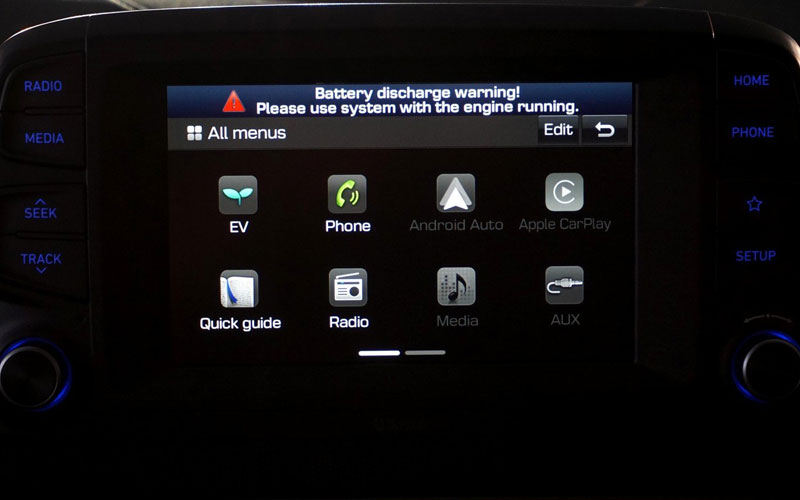
When your battery drains faster than it charges, a warning light alerts you to a problem with your car’s battery. Technically, a battery discharge warning doesn’t translate to a bad battery, but it is the current state of the car’s battery.
You can fix the battery discharge warning by turning on the car or turning off the radio, lights, climate control, etc. you are currently using. You may also need to replace the car battery or look for the core reason for getting this warning.
This blog will discuss all possible causes of “Battery Discharge Warning” and how to fix them.
What does a battery discharge warning mean?
A battery discharge warning indicates that your car’s battery is draining faster than it is being charged, which means your car is about to have an electrical failure.
This alert will appear on your car screen, infotainment system or info cluster.
A discharged battery can have devastating consequences, but it can also be a symptom of something more serious.
Some cars include a battery protection activation feature that puts the vehicle into a power saving mode. This will save battery by turning off non-essential electrical accessories.
Reasons For Battery Discharge Warning While the car is off.
Your battery is easily discharged when the engine is off. This is the case when the alternator is not charging the battery. Therefore, the battery is the only power source. Let’s look at some of the factors that can cause the battery to discharge after the engine is turned off.
Listen to the radio.
We often turn on the ignition and start listening to the radio while parked. Remember, radios are battery-operated electrical devices. If you listen to the radio with the engine off, your battery will drain.
Terminals that are not tightly connected.
The battery died from a loose connection. These terminals can cause a loss of charging even when the car is not running. If you want to prevent the annoyance of running out of battery, keep an eye out for any loose connections.
Unusual weather.
Battery discharge is not always within your control. Extreme weather is a natural phenomenon. If it’s too hot or too cold, it can damage the charging of the car’s battery. To avoid battery discharge, you should store your car in the garage during the winter.
Batteries are out of date.
Another reason for a battery to discharge unexpectedly is battery aging. A battery of an aging battery is about to end its life cycle. It may be discharged sooner than expected. The battery will lose charge immediately after the vehicle is parked.
Chargers are plug in for extended periods of time.
Car features can help us, but they can also hurt us in various situations. Most current cars come with charging ports. If you let your phone charge while the car is off, the battery will drain and the car will eventually notify you.
Parasitic drainage.
Another factor that can drain the battery is parasitic consumption. Electricity is used to drive everything from wipers on the windshield to power windows, electronic steering, and power and heated seats. Therefore, any component problem can cause the battery to draw too much current. This parasitic loss can lead to more severe battery discharge.
Turn on the headlights.
Many cars emit a warning beep if you get out of the car with your headlights on. No one is to blame for forgetting to turn off their headlights after a hard day’s work. Headlamps are the most power-hungry components in a car’s electrical system, causing the battery to quickly discharge.
Turn on climate control.
Another feature that uses battery power even when the engine is not running is climate control. On the other hand, climate control is necessary. You have to open it. However, using it for extended periods of time may discharge the battery quickly.
Reasons For Battery Discharge Warning When the car is runing.
Your battery should not discharge while the engine is running. However, sometimes this can happen. Consider several situations in which battery warnings may appear while driving.
Poor grounding
The key to avoiding fires from short circuits is the ground connection. Poor grounding can also drain the battery. Power may seep into the ground instead of charging the battery.
Short journey
In fact, driving your vehicle charges your battery. However, short trips can have the opposite effect. They don’t provide enough time to charge your vehicle’s battery. Also, if you use the radio or charging connection throughout the short trip, your battery will almost certainly drain.
Faulty charging circuit
Your sensors, alternator and starter are all part of your car’s charging system. When any of these parts are not functioning properly, your battery will drain faster than expected.
Corroded battery terminals
It is critical to check the structural condition of the battery. If its terminals are rusted or have white deposits or coverings on the surface, your battery will not charge even if your engine is running.
Worn Serpentine Belt
A depleted battery indicates damage to the serpentine belt. It is primarily responsible for powering your alternator, which produces electricity. If power is interrupted by a slip, your battery won’t get enough power.
Bad alternator
Your alternator runs your car’s charging system. Once its useful life expires, it won’t work properly. After 50,000 miles, your alternator fails and the battery no longer charges.
Low battery
A low or dead battery cannot hold enough power under any circumstances. Even with your serpentine belt and alternator, no matter how much you drive, your battery will eventually drain. Once this happens, not even the battery maintenance staff can help and we must replace the battery with a new one!
Global Positioning System
Your GPS unit may get caught in a satellite search operation, causing the battery to rapidly discharge. Resetting your GPS device by disconnecting its fuse for a few minutes is one possible option.
How To Fix Battery Discharge Warning?
Now let’s discuss how to comprehensively solve this battery discharge problem. The steps you need to take may vary from person to person, but the problem can solve.
- Open your car
The quickest remedy of all of these is to open your car. Unfortunately, when your car’s engine is on, chances are you’ll get this error from overusing the radio, charging equipment, or the climate control on your car’s battery.
So when turn on the car, the message will disappear automatically.
- Disable warnings
Different models of cars have different ways to disable the battery discharge warning, which I wouldn’t recommend. If you’re not happy, check out this tutorial on how to disable it.
- Reset battery switch
The battery drain warning is a precautionary measure in Hyundai and Kia vehicles to avoid a complete battery drain. Newer models from Hyundai and Kia have a battery reset button after their main computer disconnects the 12V battery system to avoid further discharge.
- Maintain your battery
If you still get the “Battery Discharge Warning” after resetting or starting your car, you may need to do some maintenance on your current battery.
Start by checking all connections, water levels, and other factors that affect battery performance.
- Replacement battery
The ultimate way to get rid of the battery discharge warning is to replace the battery when it is bad or too old to remain charged for a reasonable amount of time.





